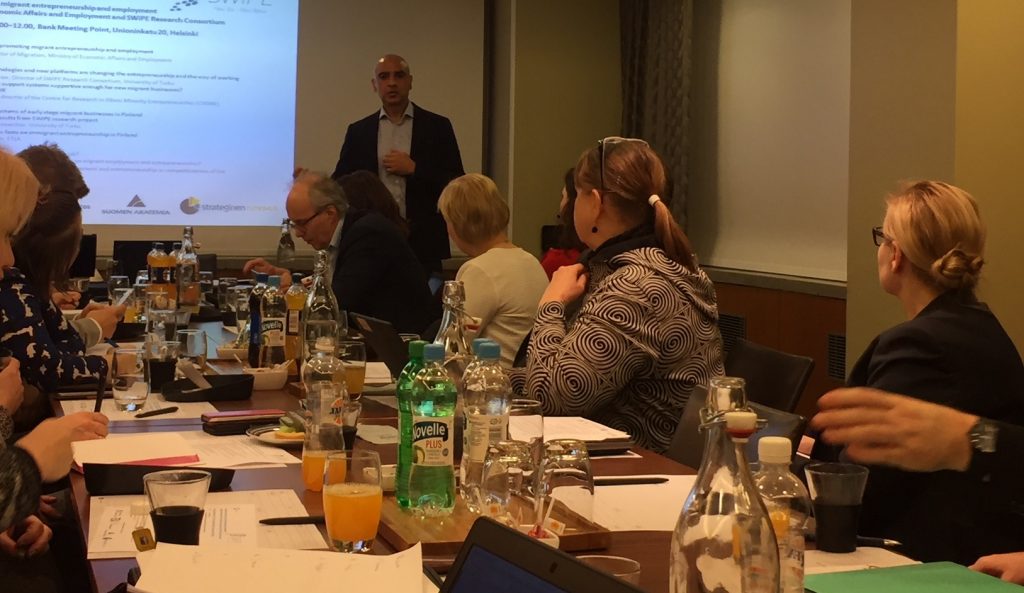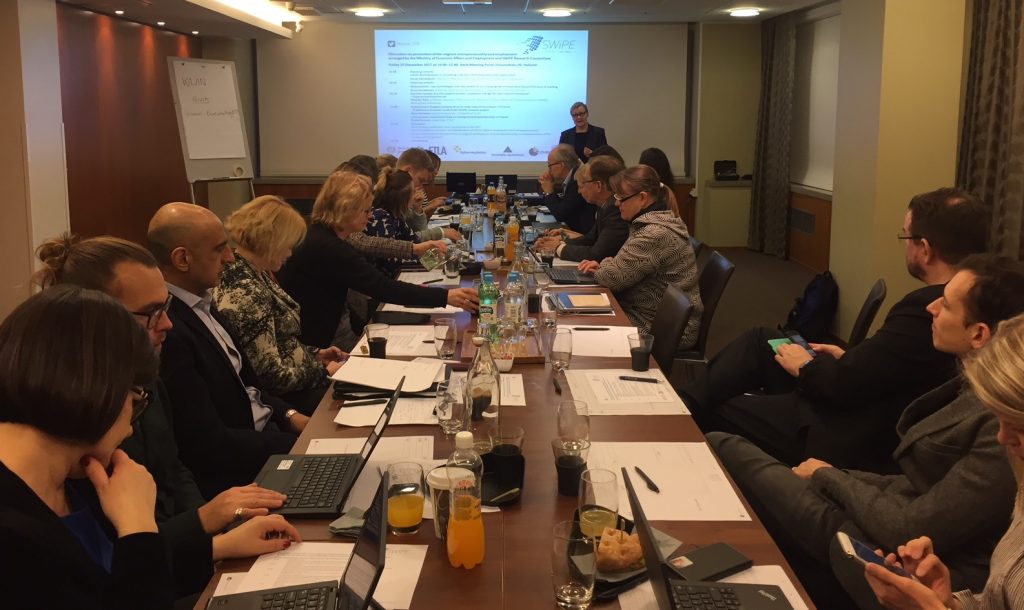The promotion of entrepreneurship and employment of immigrants was the central theme at the discussion of SWiPE researchers and a number of immigration experts e.g. from different ministries, lead by Professor Monder Ram from the University of Birmingham. Monder Ram has been studying immigrant entrepreneurship especially in the UK. He is an internationally esteemed researcher who also brings his experience to the SWiPE research project.
The debate, arranged by the Ministry of Employment and Economic Affairs and SWiPE, brought together around twenty experts of immigration to discuss current immigrant entrepreneurial issues and to hear about the experience gained from the United Kingdom, and the means available in Finland to support the entrepreneurship of people with an immigrant background.
Finland needs immigrants
The Migration Director Sonja Hämäläinen, who hosted the debate on the part of the Ministry of Employment and Industry, gave an overview of current immigration issues and said that the immigration policy agenda of the Finnish Government will be published within the rest of the year 2017. Hämäläinen emphasized that the aim is to put the potential of immigrants in Finland into use.
– No matter the reason, why someone has come to Finland. More important is who you are and what you know. Finland is ageing and we need all immigrants, Hämäläinen pointed out.
Immigrant-founded companies have significant social and economic impacts
Professor Monder Ram said that many European countries are facing the same challenges in the way we exploit the knowledge of immigrants. He praised Finland’s new approach to employing immigrants and raising issues to wider forums.
Monder Ram shared the experiences on immigrant entrepreneurship and its economic importance in the United Kingdom. At the same time, he emphasized that many decision makers are unaware of what the effects of immigrant entrepreneurship are and what is happening in this area, even though this is a very important social issue.
– Immigration is one of the most creative things that a person can do when he moves from one country to another and to difficult conditions. It requires faith and courage – the same qualities that are needed in entrepreneurship, Ram said.
Ram stressed that the effects of immigrant entrepreneurship are manifold. As an entrepreneur, an immigrant creates a job for oneself, but also often to a broader community. Immigrant-founded companies often provide opportunities for workplace learning and and it plays an important role in advancing integration. According to Ram, the social importance of companies with immigrant background is very important in addition to economic importance – many immigrant companies want to grow and are ambitious. They are flexible, creative and determined.
As a challenge in advancing immigrant entrepreneurship, Ram raised, among other things, the fact that no one clearly holds responsibility to promote entrepreneurship with immigrant background; who owns the agenda, whose mission it is to promote immigrant entrepreneurship, Ram asked. In his own research unit, he resolved the issue so that the promotion of entrepreneurship with immigrant background became “everyone’s business”. The key role in this work is to engage the various stakeholders in cooperation, but also to create confidence in immigrant companies. The work includes initiatives that engage stakeholders, campaigning and broader stakeholder occasions.

Immigrants are an economic resource
The SWiPE projekt researchers Paolo Fornaro from ETLA and Satu Aaltonen from University of Turku brought Finnish findings to the discussion. Fornaro reported that the proportion of entrepreneurs is a little lower among the immigrants than the Finns. The average income of immigrant entrepreneurs is significantly lower than the average income of other entrepreneurs.
– There are differences between the nationalities of immigrant entrepreneurs. For example, 40 % of the Turkish empolyees are entrepreneurs, when just under 5% of those who arrive from the south of Sahara, said Fornaro.
Satu Aaltonen presented SWiPE project’s preliminary findings, that are based on interviews of the immigrant entrepreneurs, and finding ways to utilize the potential of immigrants. According to Aaltonen, support services can be found from public and private sectors, but also from the EU-funded projects of non-governmental organisations. Based on preliminary findings, there are four types of challenges associated with supporting entrepreneurs with immigrant background: in which language services should be provided, should services be provided jointly or separately with services for other entrepreneurs, should services be provided digitally or personally, as well as a number of other challenges, such as what should be the role of the third sector in providing services, what happens to services after the provincial reform and can something be done with the unpredictability of public funding.
The leader of the SWiPE research project, Anne Kovalainen, who also chaired the discussion, debated the opportunities of platforms and how people can work on platforms, regardless of the boundaries of the countries. – Where we get the best “talents” for different types of work and how it affects economic development. Immigration is no longer just a question of employment, but an economic resource, Kovalainen emphasized. She said that the use of platforms is generally still low, but SWiPE project also researches how immigrants exploit digitalisation and how platform economy affects entrepreneurship and employability of immigrants.

Text and pictures: Tarja Valde-Brown
